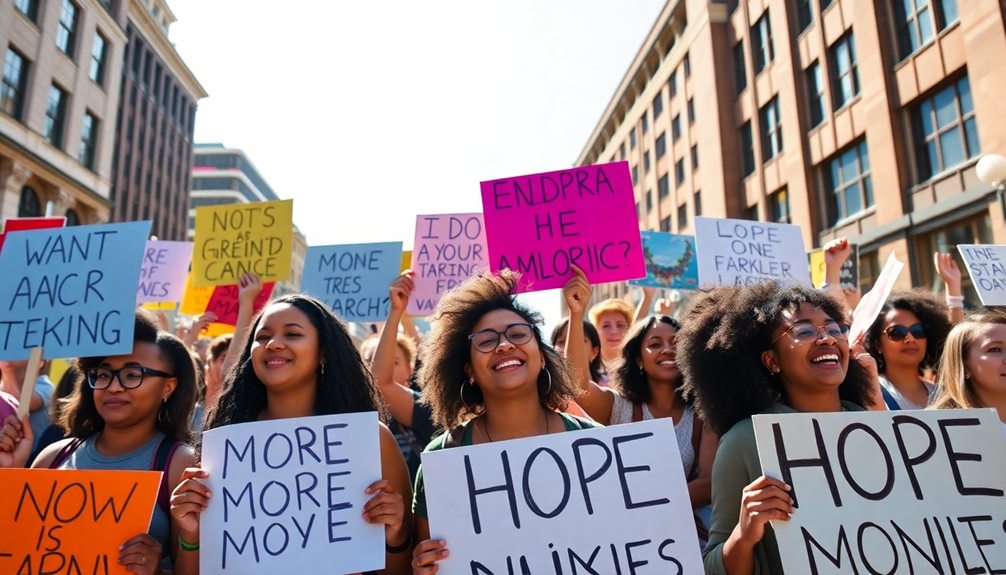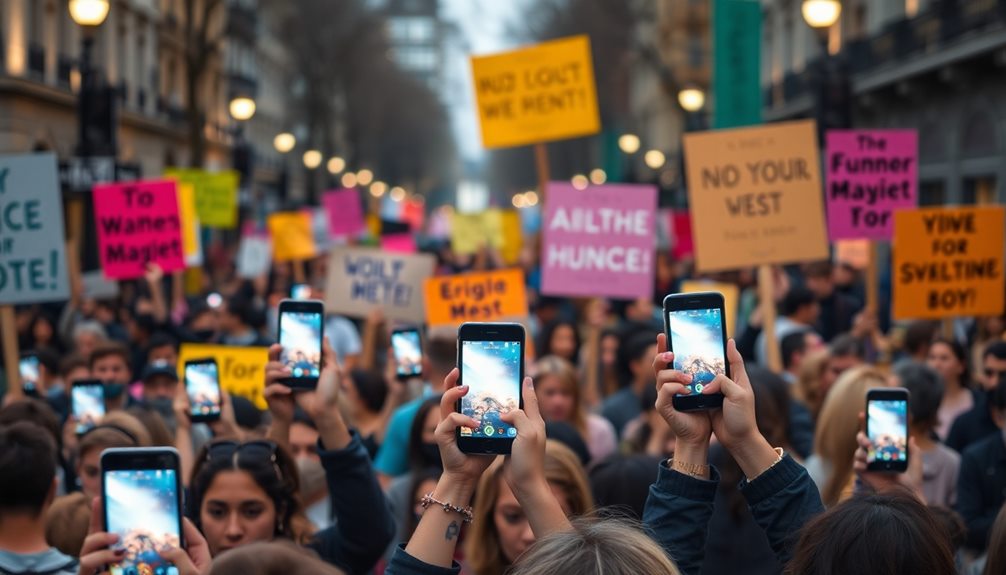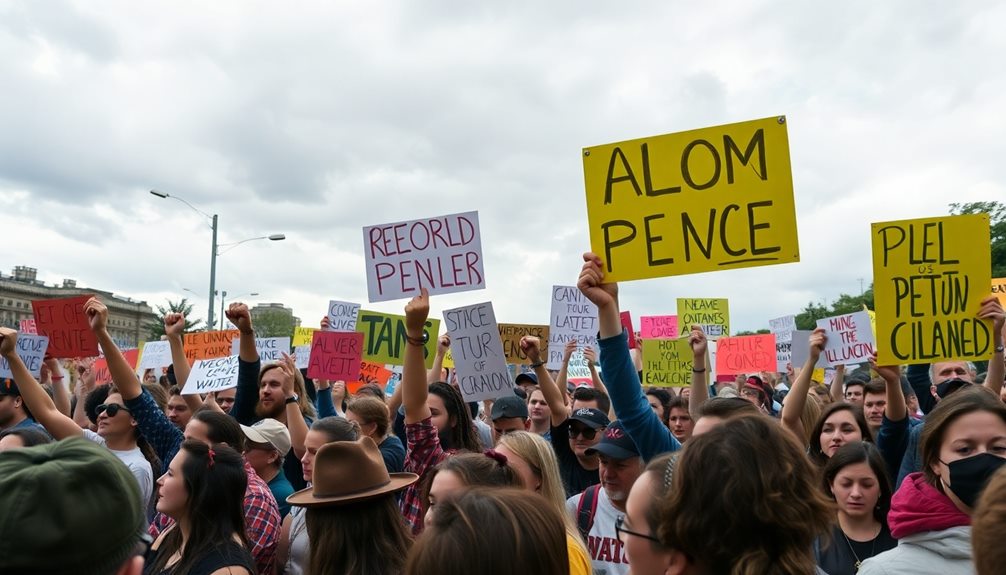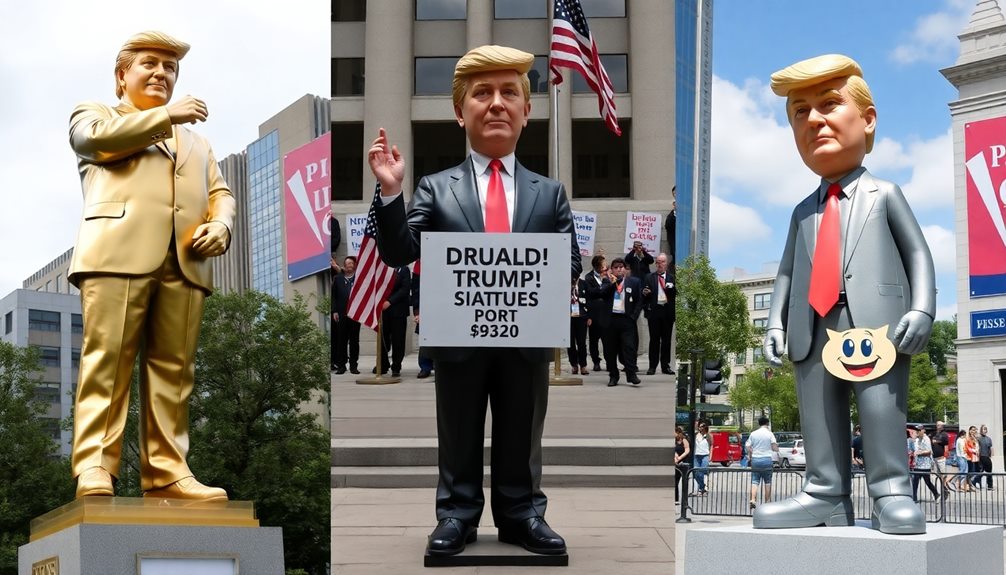Public demonstrations have enormous power to influence society and drive change. They let you voice your beliefs and advocate for justice, as seen in pivotal events like the March on Washington and Black Lives Matter protests. Social media amplifies these messages, helping to organize support and increase visibility. You can see how protests have united communities and influenced legislation throughout history. Engaging in activism can also enhance your career prospects by showcasing your leadership skills. If you're curious about the historical milestones and the role of social media, stick around to discover more!
Key Takeaways
- Protests amplify marginalized voices, facilitating civic engagement and demanding social change within communities.
- Historical protests have led to significant legislative advancements, like the Civil Rights Act and women's suffrage.
- Social media enhances protest visibility, mobilizing diverse supporters and fostering global solidarity for various movements.
- Peaceful demonstrations are protected under the First Amendment, establishing a vital right for advocating social justice.
- Engagement in activism develops skills valuable for career advancement, showcasing leadership and commitment to social change.
Introduction

Protests serve as a powerful means for individuals to voice their beliefs and push for social change. You might find that these public gatherings not only express opinions but also influence public sentiment and policy.
Historically significant protests, like the March on Washington and the Stonewall Riots, have been pivotal in advancing civil rights and social justice movements. They highlight how collective action can drive societal transformation.
Your right to assemble and protest peacefully is protected by the First Amendment of the U.S. Constitution, although it's essential to recognize that this right can face challenges from government restrictions.
In recent years, protests have gained momentum, especially after George Floyd's murder in 2020, with a staggering 74% of Americans showing support for the demonstrations. This illustrates the widespread desire for social change and justice.
Moreover, social media has emerged as an essential tool for organizing protests, helping to amplify messages and mobilize supporters from diverse backgrounds.
As you engage with these movements, remember that your voice contributes to the ongoing struggle for civil rights and equality. Together, you can make a difference through collective action and advocacy.
Background

Throughout American history, the act of gathering to voice dissent has been fundamental in shaping societal norms and policies. Protests have a long-standing tradition in the U.S., advocating for change across various social movements. From civil rights to workers' rights and environmental justice, these demonstrations reflect the collective will of the people.
One of the most notable examples is the March on Washington in 1963, which showcased the power of unity in influencing public opinion and policy changes.
More recently, the Black Lives Matter movement, ignited by the tragic murder of George Floyd in 2020, mobilized millions in over 140 U.S. cities. This movement not only highlighted systemic racism but also sparked urgent calls for police reforms.
The rise of social media has further amplified the visibility of protests, allowing for rapid organization and fostering global solidarity among diverse activist movements.
Protests serve as a critical mechanism for marginalized communities to express their demands and engage in civic responsibility. By participating in these social movements, you contribute to transformative social change, ensuring that voices long silenced are finally heard.
Historical Protest Milestones

Milestones in the history of protest reveal the power of collective action in driving social change. Take the Boston Tea Party of 1773, for instance. By dumping 342 chests of tea into Boston Harbor, American colonists boldly protested against British taxation, igniting the flame of the American Revolution.
Fast forward to 1913, when the Women's Suffrage Parade showcased over 5,000 advocates in Washington, D.C., pushing for women's voting rights and ultimately leading to the ratification of the 19th Amendment in 1920.
The March on Washington for Jobs and Freedom in 1963 brought together approximately 250,000 people, where Martin Luther King Jr. delivered his iconic "I Have a Dream" speech, significantly influencing the Civil Rights Act of 1964.
In more recent history, the Women's March in 2017 united millions across the globe, standing for women's rights and equality. The Black Lives Matter protests, particularly following the tragic death of George Floyd in 2020, have also galvanized communities to demand justice and reform.
Each of these milestones demonstrates how organized efforts can reshape society and inspire future generations to stand up for their rights.
Social Media Mobilization Trends

In today's digital age, social media serves as a powerful tool for mobilizing support and organizing protests. Platforms like Twitter and Instagram have transformed how you and others can rapidly share information and rally for events, as seen during the Women's March in 2017, which drew millions globally. These platforms enable activists to bypass traditional media channels, reaching a wider audience and creating viral movements within hours. The legacy of Pamela Chopra, known for her contributions in the realms of art and advocacy, serves as an enduring reminder of how individual voices can amplify collective causes. Her influence continues to inspire generations, highlighting the vital role of cultural figures in driving social change.
By using hashtags such as #BlackLivesMatter, movements gain visibility, sparking discussions around racial injustice that mainstream media might overlook.
Youth activists increasingly rely on social media, with about 70% stating it's their main source for information and organization. This trend highlights how crucial social media is for engaging younger generations in social movements.
Live streaming features on platforms like Facebook and Instagram allow you to document protests in real time, drawing attention to issues like police brutality and human rights violations.
Furthermore, effective campaigns, such as March For Our Lives, showcase social media's role in not just mobilizing protests but also influencing public policy discussions, particularly around gun control.
As you participate in these movements, remember that social media can enhance public safety by spreading awareness and fostering community support.
Career Advancement Through Activism

Engaging in activism can significantly boost your career prospects. When you take part in movements that promote social responsibility, you demonstrate essential skills like leadership and effective communication—qualities employers highly value.
High-profile protests, such as the Women's March or Black Lives Matter demonstrations, often provide networking opportunities with influential figures, which can lead to exciting job prospects.
As you advocate for change, you gain visibility and recognition in your community. This newfound prominence can translate into job offers or promotions as others acknowledge your dedication and ability to inspire action.
Many organizations, especially non-profits and social enterprises, actively seek candidates with direct activism experience, reflecting a genuine commitment to social change and a keen understanding of community issues. These candidates often bring valuable insights and grassroots-level perspectives that can help shape more effective strategies for addressing societal challenges. For example, understanding the role of regional political movements like Shiv Sena and its influence on community dynamics can provide critical context for tailoring initiatives to local needs. This blend of experiential knowledge and cultural awareness makes such individuals indispensable in driving meaningful, sustainable impact.
Moreover, the skills you've honed through activism—event planning, public speaking, and strategic campaigning—are assets you can proudly showcase on your resume.
During interviews, these experiences can set you apart from other candidates, making you more competitive in the job market. By aligning your career path with your passion for activism, you not only advance professionally but also contribute positively to society.
Frequently Asked Questions
What Are Protests and Demonstrations?
Protests and demonstrations are public gatherings where you express your opinions on societal issues. They often aim to raise awareness, advocate for change, and mobilize others, creating a powerful collective voice for important causes.
What Is the Power of Protest?
Protest has the power to amplify voices, challenge injustices, and spark change. By participating, you engage with your community, influence public opinion, and hold authorities accountable, making your stance an essential part of societal progress.
How Did Protest Demonstrations Aid the Civil Rights Movement?
Protest demonstrations galvanized communities, raised awareness, and pressured lawmakers. By participating, you helped spotlight injustices, inspire collective action, and ultimately contributed to landmark changes like the Civil Rights Act, shaping a more equitable society.
How Are Riots Different From Demonstrations or Protests?
Riots differ from demonstrations as they often erupt spontaneously and involve violence, overshadowing the intended message. Demonstrations focus on advocacy and dialogue, seeking change peacefully, while riots stem from intense frustration and can lead to chaos.










